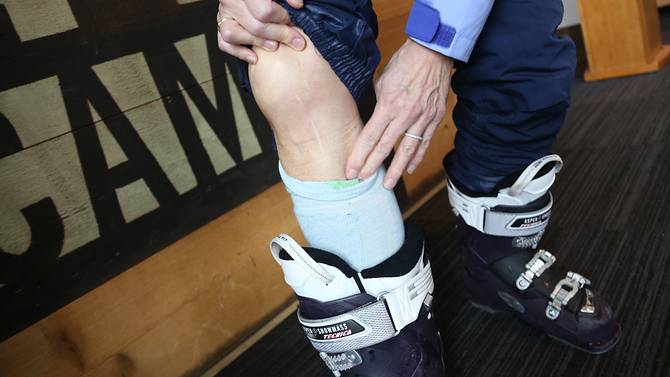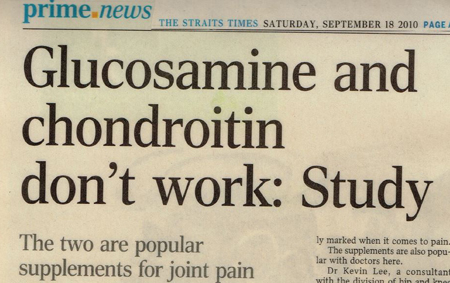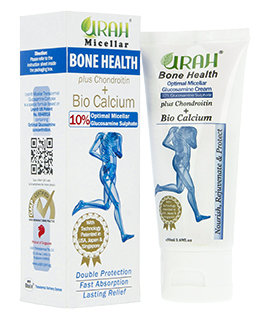
Tens of millions of people over the age of 40 report that they at least occasionally hear noises in their knees, a condition that in medical circles goes by the ominous name of crepitus. (Photo: Ⓒ 2017 The New York Times)
ROTTERDAM: Oral glucosamine, a natural supplement often marketed for joint pain, has no more effect than a dummy pill, according to a new review of available research.
The analysis of randomized controlled trials from which data have been made public found that at both three-month and 24-month follow-up points, the supplement had no effect on either hip or knee pain from arthritis.
Even analyses of the results for sub-groups of study participants, such as overweight people or those with high inflammation, found no benefit with the supplements.
"Most recent guidelines conclude there is an overall lack of efficacy of glucosamine, however, we knew that osteoarthritis could affect subgroups differently," said senior study author Sita Bierma-Zeinstra of Erasmus University Medical Center in Rotterdam, the Netherlands.
The most recent report from the U.S. National Center for Health Statistics found that Americans spent nearly US$13 billion in 2012 on natural product supplements, and glucosamine was one of the most popular.
The Osteoarthritis Research Society International and the U.S. National Institute for Health and Care Excellence recently issued guidance about the lack of evidence for glucosamine as a cure for joint pain.
"Before we threw the baby out with the bathwater, however, it was important to know whether different subgroups could have some effect," Bierma-Zeinstra told Reuters Health by email.
The researchers analyzed data from randomized, controlled trials conducted between 1994 and 2014. Of the 21 studies they found on the subject, only six shared data through the OA Trial Bank, an international collection of data from trials conducted worldwide. None of the trials included in the analysis was funded by industry, the authors note.
Five of the trials, which altogether included more than 1,600 patients, compared glucosamine with a placebo. Five of the six studies investigated knee osteoarthritis, and one looked at hip osteoarthritis.
Overall, the effects of glucosamine and the placebo on pain and physical functioning didn't differ, either in the short-term or one or two years later. The supplement was also no better than placebo among subgroups based on pain severity, severity of osteoarthritis, age, body mass index, gender or signs of inflammation.
"Of course, the most striking thing in this study is that when a commercial party funded the source, data sharing became difficult," Bierma-Zeinstra said. "Open access to data from clinical studies, although propagated by many research organizations worldwide, is still far from common practice."
In addition, the researchers found that data for a study published in 2006 was no longer available. Although data from older studies may disappear, that doesn't often happen with recent ones, she added.
The research team plans to update subgroup data in the OA Trial Bank every five years. They'll continue to contact clinical trial researchers to encourage them to contribute data to the project.
Future studies should look more closely at knee versus hip osteoarthritis and specific supplement types such as glucosamine sulfate versus glucosamine hydrochloride, the Bierma-Zeinstra's team writes in the Annals of the Rheumatic Diseases.
"Consumers should be cautious about spending money on unproven treatments," said Dr. C. Kent Kwoh, director of the University of Arizona Arthritis Center in Tucson.
For instance, side effects of glucosamine include heartburn, drowsiness, headaches, allergic reactions, weight gain, diarrhea and abdominal pain, said Kwoh, who wasn't involved in the study.
"Most consumers believe that, as a 'natural product,' glucosamine is safe, but there are potential side effects," he told Reuters Health by email. "There is very little evidence that oral glucosamine is beneficial for pain."
Source: Reuters
See full article from here >> http://www.channelnewsasia.com/news/health/glucosamine-supplements-don-t-help-knee-or-hip-arthritis-pain-9113484
Click here to Check What makes Urah Micellar Glucosamine Work

The two are popular supplements for joint pain
LONDON: Glucosamine and chondroitin, two supplements taken by millions of people around the world for joint pain, do not work, says a study by Swiss scientists.
The supplements, taken on their own or in combination to reduce pain caused by osteoarthritis in the hips and knees, should not be paid for by the health authorities or insurers, the study added.
In a review of trials involving 3,803 patients with knee or hip osteoarthritis, the Swiss researchers found that there was 'no clinically relevant effect' of chondroitin, glucosamine, or the two in combination on perceived joint pain.
'Health authorities and health insurers should not cover the costs for these preparations, and new prescriptions to patients who have not received treatment should be discouraged,' said Professor Peter Juni of the University of Bern, whose study was published in the British Medical Journal yesterday.
Osteoarthritis is the most common form of arthritis and is one of the leading causes of chronic disability in the United States. It affects about eight million people in Britain and nearly 27 million people in the US.
It is a chronic condition which is mainly treated with painkillers and anti-inflammatory drugs like aspirin and ibuprofen. Some of these drugs can cause stomach and heart problems, particularly if they are used for long periods.
Prof Juni's team said in its study that in the past decade, doctors and specialist rheumatologists have increasingly prescribed glucosamine and chondroitin to their patients, and people with joint pain also buy them over the counter.
According to their research, global sales of glucosamine supplements hit almost US$2 billion (S$2.7 billion) in 2008 - an increase of about 60 per cent since 2003.
The supplements became popular after researchers reported in The Lancet in 2001 that glucosamine may be one of the first products to prevent the worsening of osteoarthritis.
The researchers reviewed 10 previously published trials and assessed data on changes in levels of pain after patients took glucosamine, chondroitin, or a combination, compared with a placebo.
'Compared with placebo, glucosamine, chondroitin, and their combination do not reduce joint pain or have an impact on narrowing of joint space,' they wrote.
The scientists noted that despite this finding, some patients remained convinced that the supplements work.
They said this may be because of the naturally fluctuating course of osteoarthritis or due to a placebo effect, which can be particularly marked when it comes to pain.
The supplements are also popular with doctors here.
Dr Kevin Lee, a consultant with the division of hip and knee surgery at National University Hospital, said: 'Yes, I would continue prescribing glucosamine (in its sulphate form) for selected patients.
'These are patients with mild to moderate, and not severe, osteoarthritis. In the latter group, glucosamine sulphate will very likely not work.
'As an orthopaedic surgeon, I tell my patients clearly that glucosamine sulphate is essentially a mild anti-inflammatory agent with minimal side effects compared to standard painkillers and that is the reason I prescribe it to them. It has not been shown to regenerate cartilage in humans.'
He added that a second important point was that the quality and concentration of active ingredients in the huge variety of preparations available to patients vary widely.
'And studies have shown that taking certain brands (or) preparations is only as good as taking a placebo,' he said.
'My advice to patients is that if it does not seem to work after six months, then they should discontinue the supplements.'
Source: http://www.nuh.com.sg/news/media-articles_869.html
Click here to Check What makes Urah Micellar Glucosamine Work
Click here to Check How to Use Urah Products
Click here to Check the Quality of your Glucosamine Product before use

2026 © URAH Transdermal Pte Ltd. ALL Rights Reserved. Urah Privacy Policy | Terms of Service | Return Policy
Disclaimer: All contents on this website are provided for general information only, and should not be treated as a substitute for the medical advice of your Physician or any other health care professional. Urah is not responsible or liable for any diagnosis made by any user based on the content of this website. Always consult your own Physician if you're in any way concerned about your health. Urah Micellar Transdermal Cream formulae are not patented or under any patent rights.